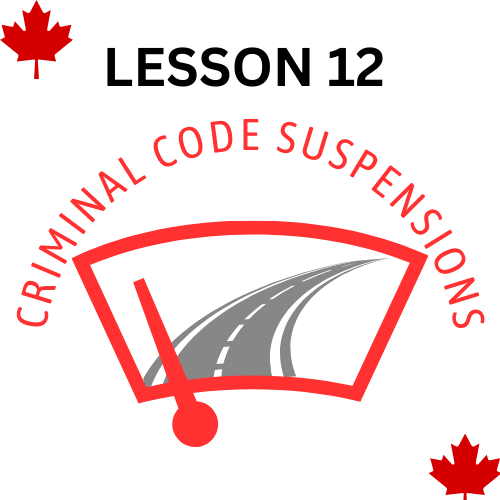Criminal Code suspensions are a Canadian legal tool that is used to protect public safety by limiting an individual’s driving privileges. They are usually imposed in response to criminal offences, especially those relating to drunk driving. The article examines the criminal code suspensions and their implications for individuals, as well as the impact of such sanctions in Canada.
Legal Framework
Criminal Code Suspensions are governed by federal law including the Criminal Code of Canada. Sections 259–261 of the Criminal Code deal with the penalties for impaired driving and the provisions that govern the suspension of driving rights.
1. Section 259: Driving while disqualified or prohibited
Infractions relating to driving when disqualified or forbidden are outlined in Section 259 (Criminal Code). As part of a sentence for impaired driving, such as driving while under the influence, individuals can be subject to a driving ban. The driving prohibition is different from suspensions administratively imposed and is the direct result of a criminal conviction.
2. Section 261: Judicial Authority for Driving Prohibition Orders
As part of sentencing for DUI offenses, Section 261 allows the court to order a driving ban. The duration of a driving prohibition depends on many factors, including the criminal history of an individual, the severity of the offense and aggravating circumstances.
The implications of criminal code suspension:
The criminal code suspensions have significant consequences for those convicted of driving under the influence. The consequences of impaired driving extend far beyond the realms of law. They can affect a person’s personal, social, professional and even financial well-being.
1. Loss of driving privileges
Loss of driving privileges is the primary result of a suspension under the Criminal Code.The loss of mobility may have a profound impact on the daily routine, job, and independence.
2. Criminal Record:
A criminal record is created when a person is convicted of impaired driving and the Criminal Code has been suspended. Criminal records can have long-term effects on employment, travel and other areas of an individual’s life. A criminal record may have long-lasting social and personal consequences.
3. Penalties for non-compliance
The penalties for non-compliance are severe. If a person continues to drive after a court has suspended their license, they could face criminal charges and fines. Repeat offenses are punished more severely, highlighting the severity of such crimes.
4. Impact of Insurance Rates on:
Insurance premiums are often increased when a criminal code suspension occurs. Some insurance providers view impaired drivers as higher-risk customers, which can lead to increased costs. Insurance rates are higher for people with criminal code suspensions, which adds to their financial burden.
The Road Safety Impact
Imposing suspensions under the Criminal Code is a fundamental part of Canada’s goal to improve road safety. The authorities restrict the driving privileges of those convicted of driving under the influence. This is to ensure public safety and discourage future incidents of this dangerous behavior.
1. Deterrence:
The suspension of driving privileges under the Criminal Code is a strong deterrent to impaired driving. Losing driving privileges and the potential for criminal charges, along with other possible consequences, can be a powerful incentive to avoid activities that may compromise road safety.
2. Prevention of Recidivism:
The legal system tries to reduce recidivism by imposing suspensions under the Criminal Code. Losing driving privileges is not just a way to punish past behaviors; it also serves as a measure of prevention.
4. Encourage Responsible Behavior
The criminal code suspensions emphasize the importance of lawful and responsible behavior while driving. In holding people accountable for driving while impaired, the authorities hope to promote a responsible driving culture and discourage dangerous driving behaviors.
The Legal Initiatives and the Enforcement Measures
Legal initiatives and enforcement actions are continuously refined and improved to enhance the effectiveness of criminal code suspensions. The initiatives aim to improve the effectiveness of the suspensions, increase compliance and enhance road safety.
1. Increased police vigilance
The role of law enforcement is crucial in apprehending and identifying individuals who are driving while suspended under the Criminal Code. Police officers monitor the roads to make sure that court-ordered driving suspensions are being followed.
2. Technological Advancements:
The use of automated systems for license plate recognition allows law enforcement officers to identify vehicles that belong to individuals who are subject to Criminal Code sanctions. Th
3. Information Sharing:
Collaboration initiatives that encourage information sharing between agencies of law enforcement and relevant organizations contribute to more efficient enforcement. Sharing databases and communicating platforms allows for the quick identification of people with Criminal Code suspensions. This ensures timely interventions.
Prevention and Rehabilitation
Preventive measures and rehabilitation are essential components in tackling the causes of impaired driving. They also reduce the chances of recidivism.
1. Driver Education Programs
The main goal of driver education programs is to raise awareness regarding the dangers associated with impaired driving. They may be required for those convicted of driving under the influence. These programs can include information on alcohol and driving and their legal implications.
2. Treatment and Rehabilitation Programs
As part of a sentence, individuals with addiction issues can be sent to rehabilitation and treatment programs. The programs are designed to tackle the issues that contribute to impaired driving and offer support and resources in order to prevent further offenses.
3. Community Support and Outreach:
Law enforcement agencies, support groups, and community organizations can work together to create a system of help for those facing criminal code suspensions. Programs of community outreach may offer resources, counselling, and assistance to assist individuals in reintegrating into society.

Conclusion:
Criminal Code suspensions play an important role in Canada in combating impaired driving and improving road safety. Legal framework and implications for offenders
Authorities are working to address impaired driving through a variety of measures, including legal initiatives, prevention measures, enforcement, and rehabilitation. Canada is committed to increasing public awareness and education and providing support to those facing Criminal Code sanctions.
